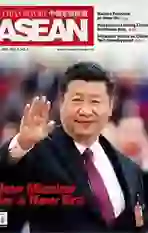Get Up and Run
2018-05-14HuangBin
Huang Bin
A Chinese participant at the 2017 Chiang Mai Marathon in Thailand recounts his race experience
With a national fitness program taking root in China, running is becoming more and more popular. Many Chinese people have found a new way of life in running marathons and have even taken their workouts with them when traveling abroad. Having experienced different routes and landscapes in their home country, Chinese marathon enthusiasts are now turning their eyes toward overseas races, making marathons a new impetus to boost regional tourism.
Among the many events held in Southeast Asia, Thailands Chiang Mai Marathon is particularly popular with Chinese runners. Chiang Mai first became well-known among Chinese citizens because of the song “Small Town Story” by iconic Taiwanese singer Teresa Teng, which was released in the 1970s. Following the 2012 release of Lost in Thailand, a Chinese blockbuster shot in Chiang Mai, the northern Thai city became one of the favorite destinations of Chinese tourists. Boasting beautiful scenery and unique culture, Chiang Mai is often regarded as one of the worlds most charming cities.
Held annually in December, the Chiang Mai Marathon drew more than 2,000 Chinese runners in 2016. In 2017, about 1,500 Chinese runners joined the race, which was held on Christmas Eve. After 10 years of development, the Chiang Mai Marathon is now one of the regions best-known and most successful regularly scheduled races.
A Party for Chinese Runners
Temperatures in Chiang Mai climb rapidly after sunrise, averaging around 26 degrees Celsius by 10 a.m. Therefore, the marathon, half marathon and minimarathon events at the Chiang Mai Marathon 2017 began at 4 a.m., 5 a.m. and 6 a.m., respectively, in order to avoid the scorching heat. I registered for the half marathon, dragging myself out of bed in the early hours of the morning. After battling tiredness for half an hour, I got ready for the races start.
It was just past 4 a.m., and the streets of Chiang Mai were completely quiet. Cars passed by occasionally, usually driven by or transporting other race contestants. It was still dark outside. Noise was heard when I approached the starting point. A host yelled “warm up” loudly in the microphone. The event organizer had invited a Chinese-speaking host to welcome the large group of Chinese runners. After a few sentences, however, I was again thrown back to the world of Thai language.
The start was positioned at Thapar Gate. Nearly 3,000 participants crowded on the narrow street before the race. When it was almost time for the race to start, the host raised his voice. The atmosphere was exciting, culminating in all the Thai contestants and viewers shouting “one, two, three” under the direction of the host. Those who dont speak Thai were confused for a short time, before realizing that the counting marked the start of the race. As the group of runners began to move forward, I heard runners activate their watches or run-tracking smartphone apps, preparing to track their pace and distance for the many kilometers ahead.
There were few cheering teams or spectators along the route, probably because the race began so early. This was a good thing though; it helped runners concentrate on the race. The early morning temperatures in Chiang Mai are perfect for running. During the race itself, there were few turns and no downhill, uphill or bumpy portions of the track, making it relatively easy to follow. Apart from three U-turns and two traffic lights along the route, the race is ideal for both first-time marathon runners and runners chasing a personal record. In fact, many first-timers from China have specifically chosen Chiang Mai as the place for their marathon debut.
A Taste of Thailand
The Chiang Mai event was my first half marathon race. Before the Chiang Mai event, I had participated in two full marathons — the Yoma International Marathon in Yangon, Myanmar, and the Chengdu WCH&WNH Marathon in Chinas Sichuan Province. Thanks to my past experience, I didnt find the Chiang Mai event to be overly difficult. A few kilometers away from the finish line, cheering crowds appeared along the side of the road. Encouraged by the Thai performers playing elephant-foot drums and gongs in great delight, runners picked up the pace for the final kick.
The half marathon courses water stops were well positioned and well equipped with drinking water and energy drinks. There was only one water stop along the route that provided food, which seemed unfriendly for foodies. But at the end of the track, a big surprise awaited.
After an hour and forty-eight minutes of running, I finally passed the finish line and received my medal from the race organizer. Stepping on to the track, I saw a lot of white sheds on both sides of the street. They offered both water and a range of special surprises. A dazzling variety of food was available, ranging from mineral water and beverages to meat congee, sticky rice, hamburgers and fried chicken. Runners are hungry people.
In addition to various food and refreshments, the Chiang Mai event featured free foot massages for full and half marathon runners. After hours of running, many participants suffered from foot pain after completing the race. By soaking their feet in cold water, runners could relax and feel their muscles being revitalized by expert Thai masseuses.
Put on shoes, stand up and stretch out a little. A beautiful day begins.
